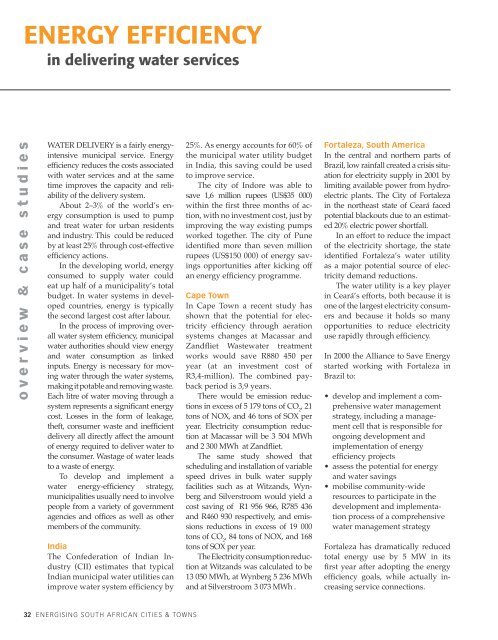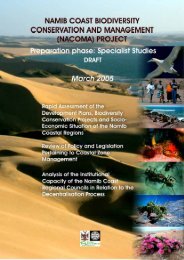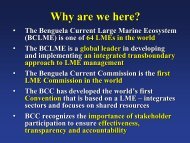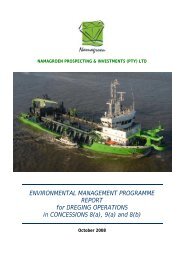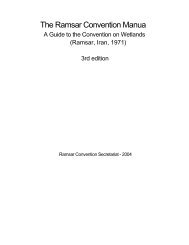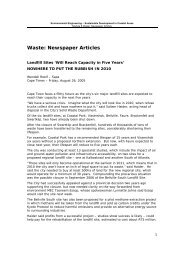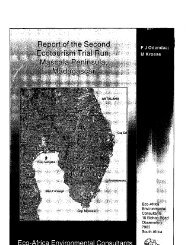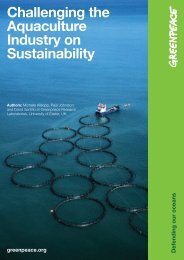Energising South African Cities & Towns - City Energy Support Unit
Energising South African Cities & Towns - City Energy Support Unit
Energising South African Cities & Towns - City Energy Support Unit
Create successful ePaper yourself
Turn your PDF publications into a flip-book with our unique Google optimized e-Paper software.
ENERGY EFFICIENCYin delivering water serviceso v e r v i e w & c a s e s t u d i e sWATER DELIVERY is a fairly energyintensivemunicipal service. <strong>Energy</strong>efficiency reduces the costs associatedwith water services and at the sametime improves the capacity and reliabilityof the delivery system.About 2–3% of the world’s energyconsumption is used to pumpand treat water for urban residentsand industry. This could be reducedby at least 25% through cost-effectiveefficiency actions.In the developing world, energyconsumed to supply water couldeat up half of a municipality’s totalbudget. In water systems in developedcountries, energy is typicallythe second largest cost after labour.In the process of improving overallwater system efficiency, municipalwater authorities should view energyand water consumption as linkedinputs. <strong>Energy</strong> is necessary for movingwater through the water systems,making it potable and removing waste.Each litre of water moving through asystem represents a significant energycost. Losses in the form of leakage,theft, consumer waste and inefficientdelivery all directly affect the amountof energy required to deliver water tothe consumer. Wastage of water leadsto a waste of energy.To develop and implement awater energy-efficiency strategy,municipalities usually need to involvepeople from a variety of governmentagencies and offices as well as othermembers of the community.IndiaThe Confederation of Indian Industry(CII) estimates that typicalIndian municipal water utilities canimprove water system efficiency by25%. As energy accounts for 60% ofthe municipal water utility budgetin India, this saving could be usedto improve service.The city of Indore was able tosave 1,6 million rupees (US$35 000)within the first three months of action,with no investment cost, just byimproving the way existing pumpsworked together. The city of Puneidentified more than seven millionrupees (US$150 000) of energy savingsopportunities after kicking offan energy efficiency programme.Cape TownIn Cape Town a recent study hasshown that the potential for electricityefficiency through aerationsystems changes at Macassar andZandfliet Wastewater treatmentworks would save R880 450 peryear (at an investment cost ofR3,4-million). The combined paybackperiod is 3,9 years.There would be emission reductionsin excess of 5 179 tons of CO 2, 21tons of NOX, and 46 tons of SOX peryear. Electricity consumption reductionat Macassar will be 3 504 MWhand 2 300 MWh at Zandfliet.The same study showed thatscheduling and installation of variablespeed drives in bulk water supplyfacilities such as at Witzands, Wynbergand Silverstroom would yield acost saving of R1 956 966, R785 436and R460 930 respectively, and emissionsreductions in excess of 19 000tons of CO 2, 84 tons of NOX, and 168tons of SOX per year.The Electricity consumption reductionat Witzands was calculated to be13 050 MWh, at Wynberg 5 236 MWhand at Silverstroom 3 073 MWh .Fortaleza, <strong>South</strong> AmericaIn the central and northern parts ofBrazil, low rainfall created a crisis situationfor electricity supply in 2001 bylimiting available power from hydroelectricplants. The <strong>City</strong> of Fortalezain the northeast state of Ceará facedpotential blackouts due to an estimated20% electric power shortfall.In an effort to reduce the impactof the electricity shortage, the stateidentified Fortaleza’s water utilityas a major potential source of electricitydemand reductions.The water utility is a key playerin Ceará’s efforts, both because it isone of the largest electricity consumersand because it holds so manyopportunities to reduce electricityuse rapidly through efficiency.In 2000 the Alliance to Save <strong>Energy</strong>started working with Fortaleza inBrazil to:• develop and implement a comprehensivewater managementstrategy, including a managementcell that is responsible forongoing development andimplementation of energyefficiency projects• assess the potential for energyand water savings• mobilise community-wideresources to participate in thedevelopment and implementationprocess of a comprehensivewater management strategyFortaleza has dramatically reducedtotal energy use by 5 MW in itsfirst year after adopting the energyefficiency goals, while actually increasingservice connections.32 ENERGISING SOUTH AFRICAN CITIES & TOWNS


